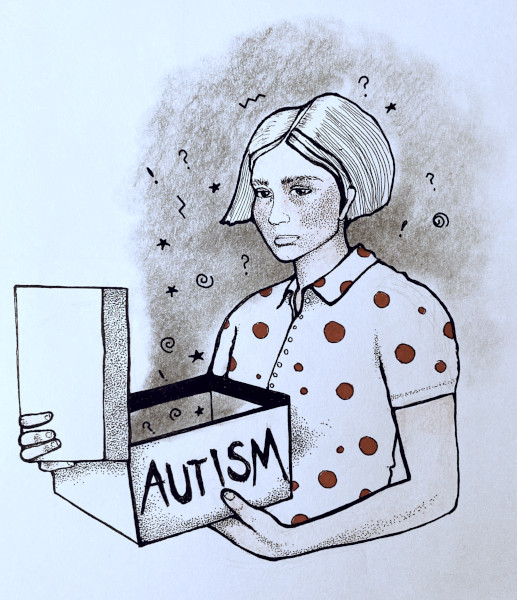Seeing the Spectrum
Late to the party

Illustration by Gabrielle Funk
When my psychologist told me this past spring that she was diagnosing me with autism spectrum disorder, my immediate reaction was relief. I was desperate for a professional to confirm what months of self-reflection and research had pointed to, and it was confirmed. I am Autistic.
Receiving a diagnosis of autism as an adult is often referred to as a “late diagnosis” by those in and around autism communities. In my experience, much of the discourse surrounding autism hinges on the assumption that autism is diagnosed during childhood, soon after Autistic traits become noticeable.
This expectation that autism is diagnosed during childhood is evident when searching for just about anything autism-related. The information and advice that shows up almost exclusively refers to Autistic children. It can seem as though Autistic adults simply don’t exist.
Looking back to my childhood, I can remember countless instances where I behaved, thought and felt things in distinctly Autistic ways. Struggling with eye contact, social anxiety, hatred of change and intense, specific interests are just a few examples. Yet none of the adults in my life even considered that I might be Autistic until just a few years ago.
The reasons some Autistic people aren’t diagnosed are varied and complex, but there are a few significant factors I want to point out. First, autism research has historically focused almost exclusively on Autistic individuals who are white and male. This has led to limited conclusions about what autism is and how it presents, which means Autistic people who don’t fit these stereotypes are more likely to go undiagnosed when young.
Secondly, some Autistic people learn to hide their Autistic traits from a young age as a survival mechanism for a world that wasn’t built with them in mind. This phenomenon is often referred to as “masking.”
Autistic masking isn’t always done deliberately or knowingly. Even as young children, some Autistic people subconsciously pick up on the ways their instincts differ from the social norms expected of them and repress their Autistic traits as much as possible.
Subconscious masking has played a huge role in my life and is a major reason why I didn’t learn I was Autistic until adulthood. It’s only now that I can see just how often I was suppressing myself, as well as how much masking has contributed to my depression and anxiety.
After so many years, learning to unmask and discovering the parts of myself that I was hiding is an incredibly difficult and emotional process. I often find myself grieving for the time I lost trying my best to be something I will never be.
Thankfully, grief is not all there is. Discovering I’m Autistic has been much more about joy. I find so much happiness in learning about the way my brain works and the ability it gives me to advocate for myself. Most of all, there is the joy in becoming part of a community of people who I can learn from, laugh with and work alongside to build an autism-inclusive world.
I’m excited to have this opportunity as a columnist to explore some of the issues facing Autistic people today, showcase the beauty of what it means to be Autistic and demonstrate why an autism-inclusive world means a better world for us all.
Hannah Penner is a criminal-justice student at the University of Winnipeg interested in prison abolition. She is a queer Autistic cat-lover who spends way too much time on Twitter.
Published in Volume 76, Number 05 of The Uniter (October 7, 2021)







